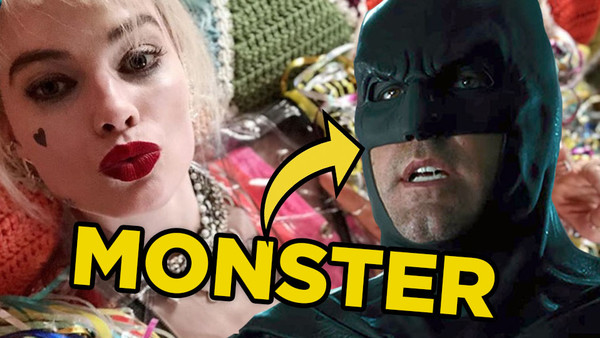How DCEU's Batman FAILED Gotham City
Birds of Prey proves Batman did more harm than good.

Though he's consistently been one of DC Comics' most popular and enduring hero characters, Batman is someone who by said popularity has drawn an equal amount of criticism, mostly in regards to how his actions are less a deterrent towards Gotham City's rampant crime than both he and many of his fans would have you believe.
No more was this more apparent than in Zack Snyder's decidedly-controversial take on the Caped Crusader in Batman v Superman: Dawn of Justice, where Gotham's favorite billionaire-cum-vigilante has no qualms about killing his perceived enemies, whether that's down the barrel of a 50-caliber machine gun or via brand that identifies sex offenders to fellow inmates for some off-the-books executions.
It's a question that writers and other stewards of the character have grappled with for years; is he actually making Gotham safer, or is he just helping create the monsters that he winds up fighting?
This year's Birds of Prey (and the Fantabulous Emancipation of One Harley Quinn) dives into this question head-on, and its answer is a resounding "No." In it, crime boss Roman Sionis (aka Black Mask) is characterized suspiciously like an evil version of the Dark Knight. He's a rich, well-connected white man who puts on a dark costume and alter ego to preserve a status quo as he sees it.
His constant demeaning and objectification of not only woman, but people in general, is like a more exaggerated version of Bruce Wayne's own playboy tendencies. A scene where Sionis shows off his worldly keepsakes to Black Canary and hints that he gets off on possessing such valuable objects, mirrors a similar exchange between Wayne and Vicki Vale in Tim Burton's Batman (1989).
Sure, Sionis is obviously an ammoral psychopath with zero qualms about killing who doesn't have the people of Gotham's best interests in mind, but that description could just as easily apply to some iterations of Batman, and it's a criticism leveled particularly at the DCEU interpretation.
Both Roman and Batman act above the law, circumventing the usual structures of the legal system in order to feed their own goals and then falling back on their wealth and status to avoid punishment.
Of course Batman is trying to stop criminals, not overtake them and their enterprises, but is he actually helping the people he claims to be protecting? Birds of Prey shows a Gotham still rampant with murder and mayhem where Roman acts with total impunity. While it's up to Harley Quinn and her comrades to take him down for their own reason, Batman is nowhere to be seen.
Furthermore, Batman's actions don't actually help the lower-classes most targeted by Gotham's criminal elite. Birds of Prey shows them desperate and willing to sell out their own friends just to get ahead. That Canary's mother was a cop gunned down in the line of duty and never avenged just goes to show how Bruce Wayne's brand of vigilante justice doesn't seem to actually be helping anyone, himself included.
Birds of Prey shows Batman not as a Dark Knight avenging Gotham's downtrodden where the justice system has failed them, but instead a glorified LARPer turning the city into a free-for-all asylum. Bruce's immense wealth and power could've just as been easily used to help improve peoples' quality of life, but that's clearly not the case, and his crime-fighting seems more like a glorified hobby than a sustained measure.
While Birds of Prey doesn't show Batman on-screen for even a moment, it offers up perhaps one of the most subversive and thought-provoking interpreations of the character and what he represents.